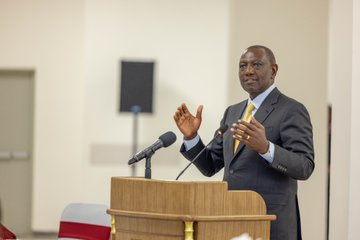

President William Ruto has called for reforms in African Union institutions.
in his address to the Permanent Representatives Committee in Addis Ababa Ethiopia, the President underscored the need for Africa to become organised and build the necessary synergy to tackle the challenges that face the continent.
This, he said, can only be achieved by a thorough reform of the African Union institutions through consultations.
"The reforms are aimed at making the institutions of the African Union more accountable, efficient and effective in serving Member States and, indeed, the people of the continent," the President said.
The Permanent Representatives Committee comprises of African ambassadors to the AU in Addis Ababa, Ethiopia.
He emphasised that in order to build a stronger Africa, the AU must evolve into an institution capable of responding swiftly to the needs of its people and its Member States.
The reform agenda led by President Ruto is focused on several core areas, each of which is crucial for ensuring the long-term success of the African Union.
In February, Ruto was picked as the new African Union champion for institutional reform, at the Assembly of the African Union heads of State and Government in Addis Ababa, Ethiopia.
In his new capacity, Ruto was tasked with among other things providing political leadership and vision that will contribute towards completing the Comprehensive Institutional Reform Initiative.
The reforms started in 2016.
President Ruto took over from President Paul Kagame of Rwanda, who previously held the position.
Some of the reforms set out include reforming the structure, functioning and focus of the African Union Commission, AU Organs and Specialised Agencies.
Ruto has been calling for reforms in the way the AU Commission has been operating since its inception.
Among the issues he has been pushing for is to establish a robust financing mechanism and to have more powers delegated to the Union when it comes to negotiating on behalf of African countries.
He insists that the Continent needs to speak in one voice and that the AU is best placed to do it.
The goal is to have such agencies become more effective and efficient in managing the programmes of the African Union.








